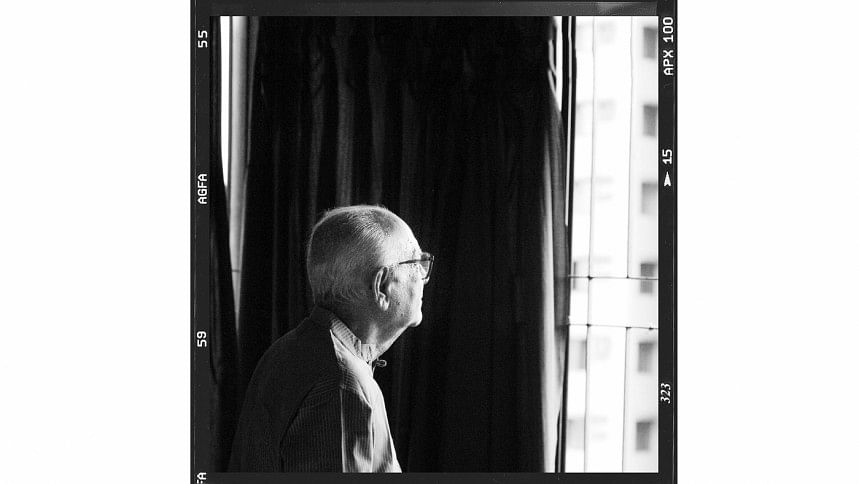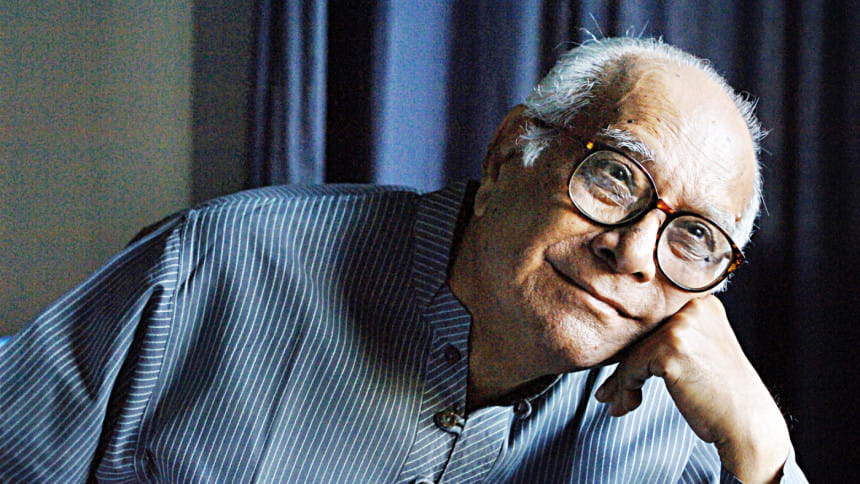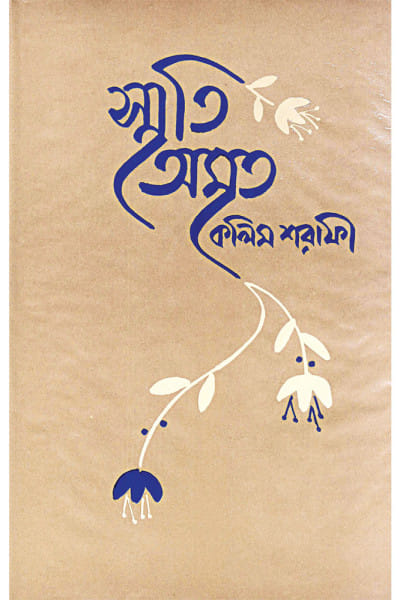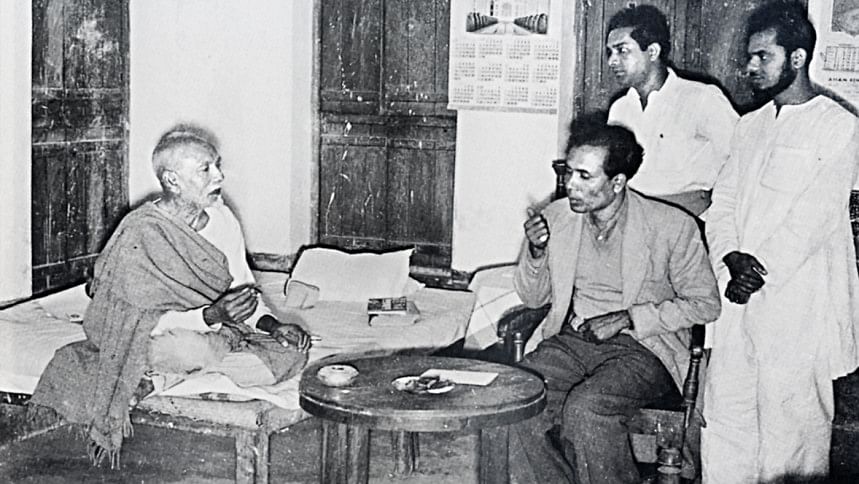A life dedicated to cultural activism

"I firmly believe in the profound impact of music, dance, and acting on shaping people's thoughts and emotions. These art forms possess the power to inspire patriotism and drive social change. My experiences in Bengal and Assam have cemented this belief in my heart so deeply that despite countless attempts, I find myself unable to detach from the influence of mass culture," Kalim Sharafi wrote in his memoirs, Smriti Amrita. This insight had been a guiding force in his lifelong cultural and political activism. This year marks the birth centenary of this icon of cultural activism.
In his youth, Sharafi delved into political ideologies such as Marxism and anti-imperialism, under the guidance of mentors and within study circles that integrated cultural and political elements.

During his time at Calcutta Madrasa as a tenth-grade student, he took part in the Holwell Monument Removal Movement under the leadership of Netaji Subhas Chandra Bose, in 1940. He became deeply involved in Gandhi's 'Quit India' movement, passionately visiting villages in his area to raise awareness, which led to his first imprisonment in August 1942. His arrest sparked unprecedented support from villagers, who chanted slogans in his favor, deeply moving him. While in prison, rumors circulated that a Muslim youth had led a revolt involving a large group of Santal. It was Kalim Sharafi who played a significant role in mobilizing both the locals and the Santal community in his area. Interestingly, he was the sole Muslim prisoner involved in the case.
While at Siuri Jail, Sharafi forged close bonds with fellow inmates Dinkar Kaushik, Anand Gopal Sengupta, and Pranab Guha Thakurta, the latter known for his affinity for Rabindra Sangeet. It was there that Sharafi was introduced to Rabindra Sangeet, singing alongside Pranab Guha Thakurta.
In 1943, he enrolled as a student at Krisnanath College and officially joined the Student Federation. However, Bengal was soon hit by famine, prompting Sharafi to immerse himself in relief efforts to aid the countless hungry people. During this time, he also joined the Indian People's Theatre Association (IPTA), a cultural movement dedicated to fostering political consciousness among the masses. IPTA quickly expanded nationwide, attracting numerous passionate artists, musicians, and playwrights. Kalim Sharafi's involvement with IPTA marked the beginning of his significant musical journey. Through performances held across the country, he found his voice in singing patriotic and anti-imperialist songs, gaining prominence as IPTA became associated with the movement. In 1946, he was admitted to City College in Calcutta but once again abandoned his academic pursuits to fully dedicate himself to the cause, particularly amidst the dire circumstances of the recent famine, which claimed the lives of 5 million people.
Following the tumultuous events of Direct Action Day on August 16, 1946, Sharafi threw himself into organizing a painting exhibition condemning communalism. This exhibition featured esteemed Muslim artists including Zainul Abedin, Shafiuddin Ahmad, Quamrul Hassan, and Khaled Chowdhury, and was hosted at both Islamia College and the Calcutta Culture Centre.
Amidst a shift in leadership in IPTA, Sharafi, alongside Maharishi Manoranjan Bhattacharya, Shambhu Mitra, Tripti Mitra, Ashok Majumder, and Mohammad Israel, left to establish the theater group 'Bahurupi.'
Kalim Sharafi's involvement with IPTA marked the beginning of his significant musical journey. Through performances held across the country, he found his voice in singing patriotic and anti-imperialist songs, gaining prominence as IPTA became associated with the movement.
Following the partition of India in 1947, communal riots resurged in Kolkata. Sharafi encountered challenges in securing employment, leading to significant financial hardship and prompting his migration from West Bengal to Dhaka. Despite fervent efforts to uphold the resolve for a unified nation transcending religious divides, the endeavors faltered, and cultural resistance faced setback. His concise yet deeply moving memoir, 'Smrita Amrita,' ended with the partition, which shattered his vision of a unified people's culture. Nonetheless, this upheaval ultimately fortified his resolve to combat communalism and separatism in all their forms.
In 1950, Kalim Sharafi relocated to Dhaka with his family, bidding farewell to West Bengal to start a new chapter in his life. Joining Dhaka Betar as a casual artist, he soon found himself ensnared in the complex web of political surveillance when the Pakistan Intelligence Department scrutinized his rendition of Sukanta's 'Surprised World.'
As a result, he had to leave Dhaka and moved to Chittagong in 1951. There, he found employment with the American company GETZ BROTHERS, only to switch to a British company in the same year.
His relocation to Chittagong led to the establishment of an organization named "Prantik" in 1951, alongside Mahbubul Alam Chowdhury, Ramen Majumdar, Choronjibi Das Sharma, and many others. "Prantik" participated in various cultural programmes, showcasing drama, songs, and dances during that period. "One of his significant contributions was the inclusion of women from respected families in drama," remarked Mahmud Selim, a cultural activist and vice president of Bangladesh Udichi Shilpigoshthi.
Unfortunately, Sharafi's stay in Chittagong was short-lived as he had to once again go into hiding due to the dissolution of the Sher-e-Bangla AK Fazlul Haq's cabinet and the imposition of Section 92. However, by the end of 1956, he returned to Dhaka with plans to launch a new organization.

"Kalim Sharafi was an organizer at heart. Throughout his life, he brought together artists to enhance cultural activities," remarked Selim.
Sharafi, alongside economist and Tagore singer Anisur Rahman, and others, formed a group named "ho-jo-bo-ro-lo" and presented Rabindranath's "Tasher Desh". In 1957, he incorporated two lines from Rabindranath Tagore's 'Dukkher Timire Je Jwale' song in the film 'Akash and Mati'. This marked a significant milestone as it was the first instance of Tagore's music being used in a film in East Bengal.
His vocal contributions as a playback singer in pioneering Bengali films such as "Mukh O Mukhosh" and Ataur Rahman's "Shurjosnan" left an indelible mark on Bangla music, enriching it with enduring classics.
However, in 1958, during Ayub Khan's military rule, the broadcasting of his songs on the radio was prohibited. Undeterred by these circumstances, Sharafi ventured into directing, bringing forth the film 'Sonar Kajol' in 1960, with Zaheer Raihan serving as an assistant director. The film was released in 1962.
In 1964, Television Center was established in Dhaka, and Sharafi was appointed as the program director in the same year. "Why the then government accepted it is still a mystery to me," expressed Sharafi in an interview. However, as the Pak-India war erupted in 1965, Rabindra Sangeet was banned in Pakistan. Consequently, he ended his tenure with the television center within two years due to allegations against him of heavily promoting Rabindra Sangeet. Later, he joined EMI recording studio in 1968.
During the Liberation War, HMV sent Kalim Sharafi to London for training, where he actively campaigned to garner public support for Bangladesh. His advocacy for Bangladesh extended to Washington, where his patriotic compositions served as a beacon of strength and inspiration for the masses during the war for independence.
In independent Bangladesh, Kalim Sharafi continued his commitment to cultural activism. From 1974 to February 1976, he served as the Public Relations Officer and General Manager at the Bangladesh Textile Industries Corporation. However, in February 1976, upon being listed on the committee for observing 'Ekushey February,' he was swiftly dismissed from his position.
Kalim Sharafi's influence on Bangla music transcended his notable singing career. At the heart of his legacy was an unparalleled dedication to studying and promoting Rabindranath Tagore's songs.

Kalim Sharafi served as the founder convener of Zahidur Rahim Smriti Parishad (1979), later known as Jatiya Rabindra Sangeet Sammilan Parishad. He was the president of the Bangladesh Rabindra Sangeet Shilpi Shanstha until his passing. In 1983, Sharafi established Shangeet Bhaban. Pijush Barua, the principal of Shangeet Bhaban, described Sharafi as not just a person but an institution, highlighting the profound impact of the school on Bangladesh's cultural fabric after its establishment in 1971. Amina Ahmed, the executive president of Bangladesh Rabindra Sangeet Shilpi Sangstha (BRSS), emphasized how the school transcended language and boundaries, becoming immensely popular and dynamic.
Despite his extensive singing career, Kalim Sharafi's recorded works are relatively modest, comprising 18 albums, 15 cassettes, and 3 CDs. Nevertheless, his contributions to Bangla music are profound, characterized by unforgettable melodies. His album "Nobo Jeeboner Gaan" (Songs of New Life) poignantly depicted the struggles of famine and conflict in the 1940s, captivating audiences with his golden voice. Some of his enchanting compositions include "Aaj holo robibar, kal kono kaj nei, raat jege tomakei bhabchhi," "Pothey pothey dilam chhoraiya re," and "Aji jhorer raatey tomar obhishar."
Kalim Sharafi's life has been an epitome of liberal thoughts. Mahmud Selim says, "Kalim bhai was naturally concise in his expressions, rarely inclined to pass judgments. His progressive nature ensured he welcomed fresh ideas with an open mind.
With eternal youthful zeal, he actively supported and inspired the nation's youth throughout his life. In a conversation, he expressed his delight, saying, "Witnessing young generations, both men and women, collaborate for a cause, no matter how small, fills me with immense pride and joy. Whether it's producing publications on culture, politics, history, or Tagore, I've had the privilege of contributing my ideas and being part of such collective endeavors."
Sharafi was honored with prestigious awards, including the Ekushey Padak in 1985 and the Shadhinota Padak in 1999. He celebrated life fervently, often expressing, "Life transcends mere pursuit of wealth and power. Its essence lies not in what we acquire, but in what we give back to others."
Kalim Sharafi's influence on Bangla music transcended his notable singing career. At the heart of his legacy was an unparalleled dedication to studying and promoting Rabindranath Tagore's songs.
Kalim Sharafi, born on May 8, 1924, into a pir family in the village of Khairadihi, located in the Siuri subdivision of Birbhum district, West Bengal, was the son of Syed Sami Ahmad and Begum Aliya. Orphaned at the tender age of four following the loss of his mother, he was raised under the loving care of his maternal grandmother. Sharafi passed away on November 2, 2010, at the age of 86 in Dhaka.
Priyam Paul and Saudia Afrin are journalists at The Daily Star.

 For all latest news, follow The Daily Star's Google News channel.
For all latest news, follow The Daily Star's Google News channel. 





Comments